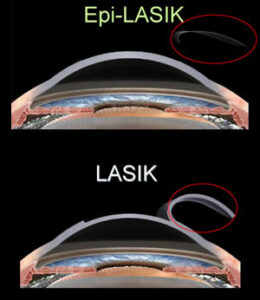When it comes to correcting vision problems, advancements in technology have paved the way for innovative solutions. One such procedure is Epi LASIK. In this blog, we will delve into the details of Epi LASIK surgery, exploring its procedure benefits, and limitations. We will also discuss its estimated cost and how it is different from other forms of surgery.
Contents
What Is Epi LASIK Surgery?
 Epi-LASIK (Epithelial Laser-Assisted In Situ Keratomileusis) is a type of laser eye surgery that is used to correct refractive vision errors. Such as nearsightedness, farsightedness, and astigmatism. It is a variation of the more commonly known LASIK procedure.
Epi-LASIK (Epithelial Laser-Assisted In Situ Keratomileusis) is a type of laser eye surgery that is used to correct refractive vision errors. Such as nearsightedness, farsightedness, and astigmatism. It is a variation of the more commonly known LASIK procedure.
Epi-LASIK is often recommended for individuals with thinner corneas or those who may not be suitable candidates for traditional LASIK due to various factors. It offers similar visual outcomes to LASIK and the procedure is faster. However, the recovery period may be slightly longer, as the epithelial layer takes time to fully regenerate.
Epi LASIK Procedure
The EpiLASIK procedure is a type of laser eye surgery designed to correct refractive errors such as nearsightedness, farsightedness, and astigmatism. Here’s an overview of the EpiLASIK procedure:
- Local anesthesia in the form of eye drops will be administered to numb the eye and ensure your comfort during the procedure.
- A specialized instrument called an epi keratome is used to create a thin flap on the surface of the cornea. The epithelial flap is gently lifted and preserved during the procedure.
- With the flap lifted, an excimer laser is used to reshape the underlying corneal tissue. The laser precisely removes microscopic amounts of tissue to correct the refractive error.
- After the cornea has been reshaped, the epithelial flap is carefully repositioned onto the corneal surface.
- A protective contact lens may be placed on the eye to aid in healing and minimize discomfort. You will be given specific instructions on post-operative care, including the use of eye drops and avoiding activities that may put a strain on the eyes.
Difference Between Epi LASIK And LASIK
 The main difference between Epi LASIK and LASIK is in the way the cornea is prepared for the laser reshaping step. In LASIK, a flap is created on the cornea using a microkeratome (a mechanical blade) or a femtosecond laser.
The main difference between Epi LASIK and LASIK is in the way the cornea is prepared for the laser reshaping step. In LASIK, a flap is created on the cornea using a microkeratome (a mechanical blade) or a femtosecond laser.
On the other hand, in EpiLASIK, a different instrument called an epi keratome is used to create a thin epithelial flap, which is a slightly thinner layer than the flap created in LASIK.
In summary, the difference between EpiLASIK and LASIK lies in the technique and instrument used to create the corneal flap before the laser treatment.
Difference Between Epi LASIK And LASEK
EpiLASIK and LASEK are both variations of laser eye surgery, but they differ in the way the cornea is prepared for the laser treatment.
In LASEK (Laser-Assisted Subepithelial Keratectomy), the flap is created by a sharp blade. The outermost layer of the cornea called the epithelium, is loosened using a diluted alcohol solution. The loosened epithelial layer is then gently moved aside, and the cornea is reshaped with a laser. After the reshaping, the epithelial layer is repositioned and protected with a special contact lens.
On the other hand, in EpiLASIK, no alcohol solution is used in the procedure. Also, the thin epithelial flap is created on the cornea using a different instrument called an epi keratome. This instrument has an oscillating plastic blade with a thin blunt edge.
What Are The Advantages Of Epi LASIK?
 EpiLASIK offers several potential advantages compared to other laser eye surgery procedures:
EpiLASIK offers several potential advantages compared to other laser eye surgery procedures:
- Reduced risk of complications
Epi LASIK eliminates the use of a microkeratome blade. This reduces the risk of complications associated with the creation of a corneal flap.
- Preserves more corneal tissue
EpiLASIK preserves a thicker layer of corneal tissue compared to LASIK. This makes it a suitable option for individuals with thinner corneas or those at higher risk for corneal instability.
- Reduced risk of dry eye syndrome
Since EpiLASIK does not involve cutting nerves in the cornea to create a flap, it may result in a lower incidence of dry eye syndrome, a common side effect of laser eye surgery.
- Potential for rapid visual recovery
Although individual healing times may vary, EpiLASIK generally offers a shorter recovery period compared to other procedures like PRK (Photorefractive Keratectomy) and LASEK.
Who Should Go For Epi LASIK?
 EpiLASIK may be a suitable option for individuals who meet certain criteria. The final decision should be made in consultation with an ophthalmologist or refractive surgeon. But, just to get an idea here are some general considerations for individuals who may consider EpiLASIK:
EpiLASIK may be a suitable option for individuals who meet certain criteria. The final decision should be made in consultation with an ophthalmologist or refractive surgeon. But, just to get an idea here are some general considerations for individuals who may consider EpiLASIK:
- Vision prescription
EpiLASIK is often recommended for individuals with moderate to high degrees of nearsightedness, farsightedness, or astigmatism. It can correct refractive errors ranging from -1.00 to -10.00 diopters for nearsightedness, +1.00 to +4.00 diopters for farsightedness, and astigmatism up to 6.00 diopters.
- Corneal thickness
EpiLASIK can be suitable for individuals with thinner corneas who may not be good candidates for LASIK. The thickness of the cornea is evaluated during the pre-operative assessment to ensure there is sufficient tissue for the procedure.
- Stability of vision prescription
Candidates for EpiLASIK should have a stable vision prescription for at least one year before the surgery. Stability ensures that any changes in the prescription have stabilized, resulting in accurate correction.
- Healthy eyes
Candidates should have overall good eye health, free from any significant eye conditions or diseases such as severe dry eye, glaucoma, cataracts, or corneal diseases.
- Realistic expectations
It is crucial for individuals considering EpiLASIK to have realistic expectations regarding the outcomes of the procedure. While EpiLASIK can significantly reduce or eliminate the need for glasses or contact lenses, perfection or guaranteed 20/20 vision cannot be guaranteed in every case.
Cost Of Epi LASIK
 The cost of EpiLASIK surgery can vary depending on various factors. Such as the geographical location, the reputation and experience of the surgeon, the technology and equipment used, and any additional services included in the package. Generally, EpiLASIK surgery tends to be priced similarly to other laser eye surgery procedures like LASIK and PRK.
The cost of EpiLASIK surgery can vary depending on various factors. Such as the geographical location, the reputation and experience of the surgeon, the technology and equipment used, and any additional services included in the package. Generally, EpiLASIK surgery tends to be priced similarly to other laser eye surgery procedures like LASIK and PRK.
In India, the average cost of EpiLASIK surgery can range from approximately INR 15000 to 30,000 per eye. However, it’s important to note that this is just an estimate. The actual cost can be higher or lower based on the factors mentioned earlier.
It is recommended to consult with surgeons or clinics to get a comprehensive understanding of the cost. Moreover, you can also get an idea of their specific services and aftercare included in the price. Additionally, it’s advisable to inquire about any financing options, insurance coverage, or flexible payment plans that may be available to help manage the cost of the procedure.
Conclusion
In conclusion, EpiLASIK is a laser eye surgery procedure that offers advantages. Such as reduced risk of complications, preservation of corneal tissue, and potential for rapid visual recovery. It is suitable for individuals with moderate to high refractive errors and thinner corneas. However, it also has limitations, including slower visual recovery and the potential for discomfort and corneal haze. If you are considering EpiLASIK or any other laser eye surgery, it is essential to seek help from a qualified ophthalmologist or refractive surgeon for a thorough evaluation and personalized advice.
Lasik surgery is a safe 10-minute procedure to help you get rid of glasses. EyeMantra offers the most advanced LASIK options including PRK, Femto LASIK, SMILE surgery, Standard LASIK, ICL, and Contoura vision. If you have any questions on LASIK surgery in Delhi, Lasik surgery cost, and Lasik procedure, call us at 9711116605 or email at [email protected].



medicine in mexico pharmacies
https://cmqpharma.online/# buying prescription drugs in mexico
mexican mail order pharmacies
mexican online pharmacies prescription drugs: mexican pharmacy online – mexican rx online
best online pharmacies in mexico: purple pharmacy mexico price list – medication from mexico pharmacy
mexico drug stores pharmacies: mexican border pharmacies shipping to usa – mexico drug stores pharmacies
buying prescription drugs in mexico online medicine in mexico pharmacies medicine in mexico pharmacies
http://indiapharmast.com/# best online pharmacy india
medication from mexico pharmacy: п»їbest mexican online pharmacies – п»їbest mexican online pharmacies
online shopping pharmacy india: indianpharmacy com – online shopping pharmacy india
top 10 online pharmacy in india best online pharmacy india indian pharmacy online
https://foruspharma.com/# pharmacies in mexico that ship to usa
india pharmacy mail order: cheapest online pharmacy india – top 10 online pharmacy in india
medication from mexico pharmacy mexican drugstore online mexican mail order pharmacies
http://indiapharmast.com/# top 10 online pharmacy in india
mexican pharmaceuticals online: mexico pharmacy – mexican mail order pharmacies
http://amoxildelivery.pro/# amoxicillin for sale online
Paxlovid over the counter: paxlovid india – Paxlovid over the counter
http://clomiddelivery.pro/# cost of generic clomid without prescription
buy amoxicillin 500mg online: buy amoxicillin online without prescription – amoxicillin canada price
https://ciprodelivery.pro/# ciprofloxacin generic price
https://doxycyclinedelivery.pro/# generic doxycycline
paxlovid price: Paxlovid over the counter – paxlovid pharmacy
http://doxycyclinedelivery.pro/# doxycycline 50 mg price uk
http://ciprodelivery.pro/# buy generic ciprofloxacin
paxlovid pill: paxlovid cost without insurance – paxlovid india
http://paxloviddelivery.pro/# paxlovid covid
can you buy cheap clomid for sale: can i order clomid without prescription – buying generic clomid tablets
https://doxycyclinedelivery.pro/# doxycycline over the counter nz
https://clomiddelivery.pro/# where buy generic clomid
buy cipro online usa: ciprofloxacin 500mg buy online – buy cipro no rx
doxycycline where to get: order doxycycline 100mg without prescription – doxycycline 50